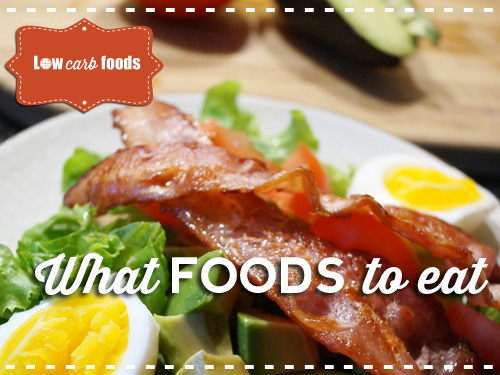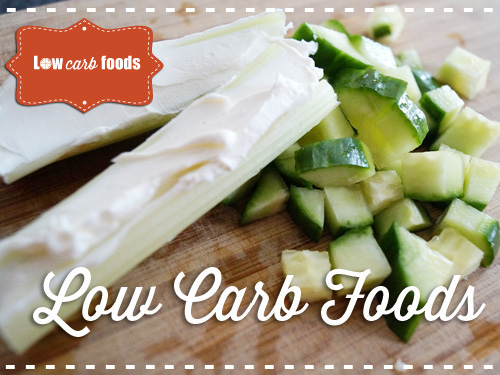What foods to eat on a low carb diet?
Low-carb enthusiasts tend to be very concerned about what foods to eat and what to avoid on a diet. The following list offers a better acquaintance with the foods to choose on a low carb diet.
Foods Containing Protein
Low-carb diets are typically equated with high-protein ones as consuming enough protein forms the basis of a low-carb diet. Nevertheless, an upper limit of 35 percent of calories, consumed in the form of protein, is recommended by medical practitioners and nutritionists. Animal foods are rich in protein and low in carbs. Such are meats as poultry and low-fat cuts of pork, beef, lamb, and veal. Other acceptable protein sources are all kinds of fish and seafood, eggs, beans, tofu, and low-fat meat substitutes. Some foods are very high in protein while others contain only small amounts. Foods that are loaded with protein include eggs, cottage cheese, pork chops, steak and bacon. Some foods are low in protein but fit into a low-carb menu while others top the banned list. You can have vegetables such as onions, celery, and parsley but definitely avoid corn, potato, spaghetti, and macaroni.
Dairy Products
There is a wide selection of dairy products that can be included in a low carb diet. These are Soft Cheeses, Hard Cheeses, Cottage Cheese. Dairy products such as butter, cream cheese, and full-fat cheeses are allowed but their consumption should be limited. Dairy products are loaded with key nutrients such as phosphorus, vitamin D, calcium, vitamin B12, riboflavin and protein. Cheese is a great source of protein, phosphorus, and calcium. If you are a vegan or have lactose intolerance, there are dairy substitutes for chocolate, butter, cheese, milk, and cream. Substitutes for cheese include tofu, cashew cheese, almond feta, vegan parmesan, buffalo mozzarella, and others. There are also great butter substitutes such as coconut butter, cooking and baking oils, and others. If you love dairy products, however, there is plenty of choice, from buttermilk powder, and yogurt to cottage cheese, clotted cream, custard, curd and frozen yogurt. Grocery stores also offer fermented milks which are fermented with bacteria such as Leuconostoc, Lactococcus, and Lactobacillus. Fermented milk offers plenty of benefits, including stronger immune system, improved digestion, reduction of fatigue, and weight loss.

Vegetables
One can include a large quantity of vegetables in a low carbohydrate diet, such as asparagus, mushrooms, peppers, eggplant, cucumbers, cabbage, onions, celery, pumpkin, green-leaf vegetables, etc. Cauliflower and broccoli are allowed in limited amounts. Ideally, vegetables should form the largest food group in a low-carb diet; they should cover at least half of the plate. A good example of a low-carb meal is a large salad with protein meal and dressing. Vegetables to be avoided are the starchy ones, such as potatoes, beets, winter squash, corn, carrots, and peas. Vegetables are loaded with key nutrients, including antioxidants, vitamins, and dietary fiber. Dietary fiber is an important component of our menu because soluble fiber helps slow down digestion and facilitates weight control. The reason is that dieters feel full longer. Soluble fiber is found in vegetables such as cucumbers, onion, spinach, and others. Insoluble fiber found in vegetables is also good for health because it speeds up food passage and aids weight loss. Insoluble fiber is found in veggies such as green beans, carrots, tomatoes, and onions. Good sources are also celery, zucchini, and broccoli. Vegetables are also loaded with important nutrients such as copper, selenium, sodium, magnesium, potassium, vitamin B1, vitamin C, and others. Vegetables are essential for a balanced diet because they reduce the risk for chronic and serious diseases, facilitate the production of red blood cells, reduce bad cholesterol levels, and fight hypertension. A menu rich in vegetables reduces the risk for diabetes, heart problems, cancer, and stroke.
Fruits
Consumed in limited amounts, they constitute a part of the low-carb dietary plan. One can eat fruits that are low to medium in sugar such as cantaloupe, strawberries, blackberries, raspberries, blueberries, lemons, limes. The fruits which contain the highest quantity of sugar are all dried fruit (for instance, raisins and figs, among others) and tropical fruits, such as bananas, oranges, and pineapples. Fruits are also packed with essential nutrients such as vitamins, phytonutrients, minerals, pigment, and antioxidants. They offer multiple health benefits and help protect from serious diseases such as osteoporosis, colon cancer, Alzheimer's disease, macular degeneration, and others. Depending on your diet, fruits may be banned during the initial or introductory phase. If fruits are allowed, it is best to buy local, regional fresh produce. Organic and bio fruits are healthier choices because they are free of pesticides and other harmful chemicals which cause health problems such as reproductive and neurological problems, vomiting, nausea and headaches.

Grains and Nuts
One can afford to eat dried nuts such as walnuts, cashews, almonds, and pistachios. High-fiber complex carbohydrates such as whole grain breads, brown rice, barley, and whole grain pastas are accepted by some people as a part of a moderately low-carbohydrate diet. Grains and nuts are an essential component of a low carb menu because they are diet friendly and rich in nutrients such as protein and minerals. Nuts and seeds such as sunflower, pistachios, and almonds are low in saturated fat and high in protein content. If you are a vegan or vegetarian and are on a low carb diet, then nuts are a great source of protein. You can have pine nuts, hazel nuts, and walnuts which are also low in saturated fat and rich in protein. Nuts are high in fat, and you can add a handful to many recipes for a filling meal. Nuts high in fat include pecans and macadamia nuts which are low in protein. Nuts also contain omega-3 fatty acids and alpha linoleic acid which helps reduce oxidation and inflammation.
Fats
It is important to satisfy your needs for essential fats like Omega-3 fats by eating fatty fish - salmon and mackerel, and flax oil. Foods with a high amount of monounsaturated fat, such as olive oil, avocado, and nuts, have indisputable health benefits. Monounsaturated fat offers health benefits such as reduced belly fat and weight loss, reduced cholesterol levels, and lower risk for stroke, heart problems, and cancer. Omega-3 also offers plenty of health benefits such as reduced risk for sudden cardiac death, healthy heart, lower blood pressure and reduced depression. Foods highest in omega-3 include fish oil, chia seeds, flaxseed, radish seeds, and caviar. Basil, walnuts, and butternuts are also high in omega-3.
It has been proved that even the unhealthy saturated fats can be consumed in limited amounts in a low-carb diet. Nevertheless, olive oil and Omega-3 fats are better. Still, many gurus of low-carb dietary systems are firmly opposed to trans-fats.
Other products such as low-carb beer as well as dry red and white wines may be consumed in limited quantities. Moreover, being on a low-carb diet doesn't mean that you can never have a candy bar or a piece of cake. However, it is better to consider such sugary and starchy foods as planned treats.
